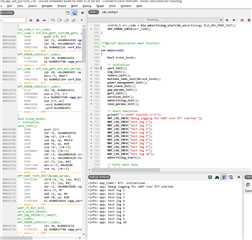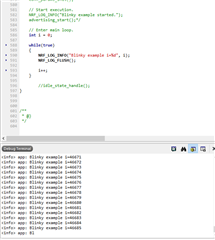Hi,
After long time(around 5 years) Im try developing ble things on my nrf52840 DK Preview board and found some issues with NRF_LOG functions...
I use latest SEGGER Studio(5.42a) and latest fw(Feb 2 2021 16:47:20) on JLINK. Im try update dll in SEGGER Studio from 6.98e to 7.00 but doesnt help. Im using latest nrf5 SDK 17.0.2
What is problem? For example if there is a lot of lines of log they are lost. For example it print 9 lines and all next lines are lost.
I call logging like this(no variable only fixed string):
NRF_LOG_INFO("App Control started.");
NRF_LOG_FLUSH();
Same happen also with one demo which print around 100 lines and if remember right it print only around 60 lines...
Im try call NRF_LOG_FLUSH after every NRF_LOG_INFO call but do not help...
Im try change different settings for buffer, rtt buffers, to block rtt if fifo is full but log data are still lost...
Im increase SEGGER_RTT_CONFIG_BUFFER_SIZE_UP, SEGGER_RTT_CONFIG_MAX_NUM_UP_BUFFERS, SEGGER_RTT_CONFIG_BUFFER_SIZE_DOWN, SEGGER_RTT_CONFIG_MAX_NUM_DOWN_BUFFERS.
Im set SEGGER_RTT_CONFIG_DEFAULT_MODE to 2(BLOCK_IF_FIFO_FULL).
I have enabled(1) NRF_LOG_BACKEND_RTT_ENABLED
Im increase NRF_LOG_BACKEND_RTT_TEMP_BUFFER_SIZE
I have disabled(0) NRF_LOG_BACKEND_UART_ENABLED.
I have enabled(1) NRF_LOG_ENABLED
Im increase NRF_LOG_BUFSIZE
Im try NRF_LOG_DEFERRED set to 0 and 1.
Im try increase NRF_LOG_STR_PUSH_BUFFER_SIZE
Any idea what I can try or how to log data without lost lines of log? Currently I don't care if logging slow down application, and it need more time/power to do work...
Thanks for any help.




